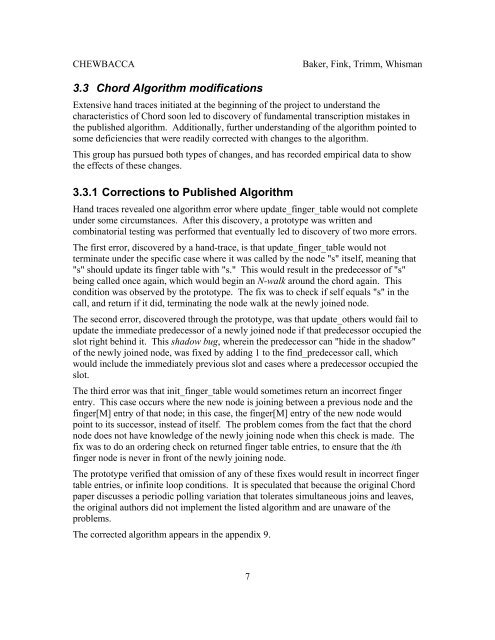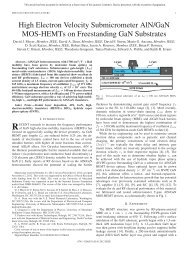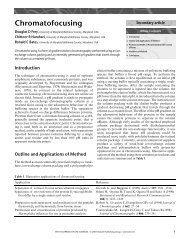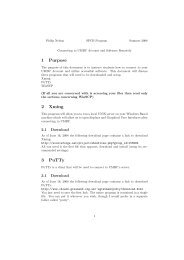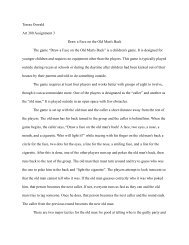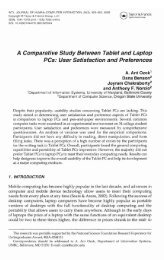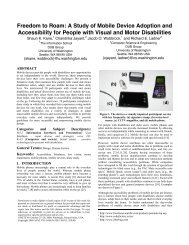Implementing a Distributed Peer to Peer File Sharing System ... - Umbc
Implementing a Distributed Peer to Peer File Sharing System ... - Umbc
Implementing a Distributed Peer to Peer File Sharing System ... - Umbc
Create successful ePaper yourself
Turn your PDF publications into a flip-book with our unique Google optimized e-Paper software.
CHEWBACCA Baker, Fink, Trimm, Whisman<br />
3.3 Chord Algorithm modifications<br />
Extensive hand traces initiated at the beginning of the project <strong>to</strong> understand the<br />
characteristics of Chord soon led <strong>to</strong> discovery of fundamental transcription mistakes in<br />
the published algorithm. Additionally, further understanding of the algorithm pointed <strong>to</strong><br />
some deficiencies that were readily corrected with changes <strong>to</strong> the algorithm.<br />
This group has pursued both types of changes, and has recorded empirical data <strong>to</strong> show<br />
the effects of these changes.<br />
3.3.1 Corrections <strong>to</strong> Published Algorithm<br />
Hand traces revealed one algorithm error where update_finger_table would not complete<br />
under some circumstances. After this discovery, a pro<strong>to</strong>type was written and<br />
combina<strong>to</strong>rial testing was performed that eventually led <strong>to</strong> discovery of two more errors.<br />
The first error, discovered by a hand-trace, is that update_finger_table would not<br />
terminate under the specific case where it was called by the node "s" itself, meaning that<br />
"s" should update its finger table with "s." This would result in the predecessor of "s"<br />
being called once again, which would begin an N-walk around the chord again. This<br />
condition was observed by the pro<strong>to</strong>type. The fix was <strong>to</strong> check if self equals "s" in the<br />
call, and return if it did, terminating the node walk at the newly joined node.<br />
The second error, discovered through the pro<strong>to</strong>type, was that update_others would fail <strong>to</strong><br />
update the immediate predecessor of a newly joined node if that predecessor occupied the<br />
slot right behind it. This shadow bug, wherein the predecessor can "hide in the shadow"<br />
of the newly joined node, was fixed by adding 1 <strong>to</strong> the find_predecessor call, which<br />
would include the immediately previous slot and cases where a predecessor occupied the<br />
slot.<br />
The third error was that init_finger_table would sometimes return an incorrect finger<br />
entry. This case occurs where the new node is joining between a previous node and the<br />
finger[M] entry of that node; in this case, the finger[M] entry of the new node would<br />
point <strong>to</strong> its successor, instead of itself. The problem comes from the fact that the chord<br />
node does not have knowledge of the newly joining node when this check is made. The<br />
fix was <strong>to</strong> do an ordering check on returned finger table entries, <strong>to</strong> ensure that the ith<br />
finger node is never in front of the newly joining node.<br />
The pro<strong>to</strong>type verified that omission of any of these fixes would result in incorrect finger<br />
table entries, or infinite loop conditions. It is speculated that because the original Chord<br />
paper discusses a periodic polling variation that <strong>to</strong>lerates simultaneous joins and leaves,<br />
the original authors did not implement the listed algorithm and are unaware of the<br />
problems.<br />
The corrected algorithm appears in the appendix 9.<br />
7


